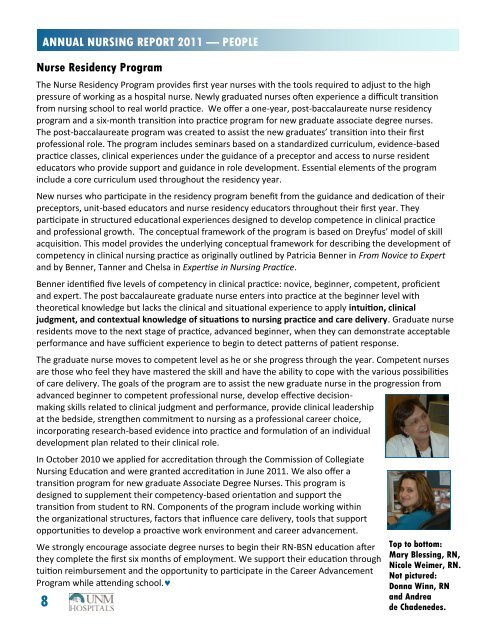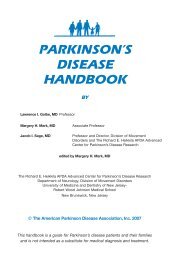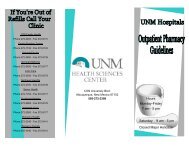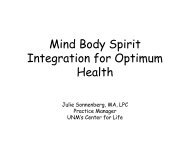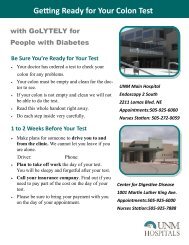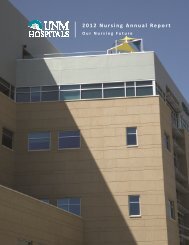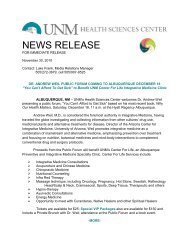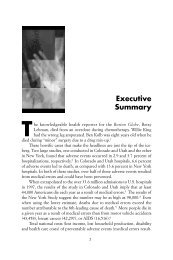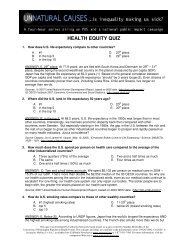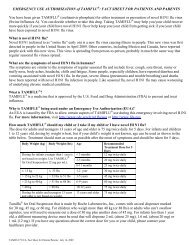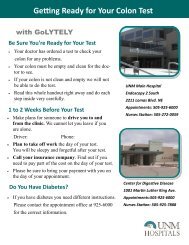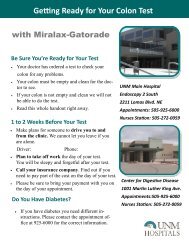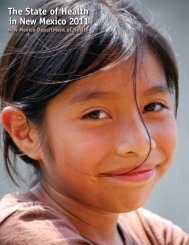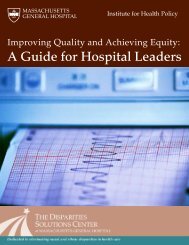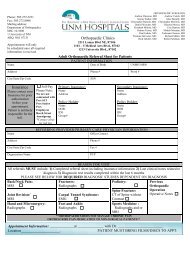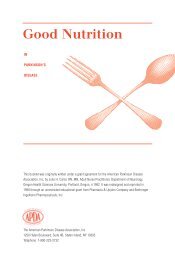2011 Nursing Annual Report - UNM Hospitals - University of New ...
2011 Nursing Annual Report - UNM Hospitals - University of New ...
2011 Nursing Annual Report - UNM Hospitals - University of New ...
You also want an ePaper? Increase the reach of your titles
YUMPU automatically turns print PDFs into web optimized ePapers that Google loves.
ANNUAL NURSING REPORT <strong>2011</strong> — PEOPLE<br />
Nurse Residency Program<br />
The Nurse Residency Program provides first year nurses with the tools required to adjust to the high<br />
pressure <strong>of</strong> working as a hospital nurse. <strong>New</strong>ly graduated nurses <strong>of</strong>ten experience a difficult transition<br />
from nursing school to real world practice. We <strong>of</strong>fer a one-year, post-baccalaureate nurse residency<br />
program and a six-month transition into practice program for new graduate associate degree nurses.<br />
The post-baccalaureate program was created to assist the new graduates’ transition into their first<br />
pr<strong>of</strong>essional role. The program includes seminars based on a standardized curriculum, evidence-based<br />
practice classes, clinical experiences under the guidance <strong>of</strong> a preceptor and access to nurse resident<br />
educators who provide support and guidance in role development. Essential elements <strong>of</strong> the program<br />
include a core curriculum used throughout the residency year.<br />
<strong>New</strong> nurses who participate in the residency program benefit from the guidance and dedication <strong>of</strong> their<br />
preceptors, unit-based educators and nurse residency educators throughout their first year. They<br />
participate in structured educational experiences designed to develop competence in clinical practice<br />
and pr<strong>of</strong>essional growth. The conceptual framework <strong>of</strong> the program is based on Dreyfus’ model <strong>of</strong> skill<br />
acquisition. This model provides the underlying conceptual framework for describing the development <strong>of</strong><br />
competency in clinical nursing practice as originally outlined by Patricia Benner in From Novice to Expert<br />
and by Benner, Tanner and Chelsa in Expertise in <strong>Nursing</strong> Practice.<br />
Benner identified five levels <strong>of</strong> competency in clinical practice: novice, beginner, competent, pr<strong>of</strong>icient<br />
and expert. The post baccalaureate graduate nurse enters into practice at the beginner level with<br />
theoretical knowledge but lacks the clinical and situational experience to apply intuition, clinical<br />
judgment, and contextual knowledge <strong>of</strong> situations to nursing practice and care delivery. Graduate nurse<br />
residents move to the next stage <strong>of</strong> practice, advanced beginner, when they can demonstrate acceptable<br />
performance and have sufficient experience to begin to detect patterns <strong>of</strong> patient response.<br />
The graduate nurse moves to competent level as he or she progress through the year. Competent nurses<br />
are those who feel they have mastered the skill and have the ability to cope with the various possibilities<br />
<strong>of</strong> care delivery. The goals <strong>of</strong> the program are to assist the new graduate nurse in the progression from<br />
advanced beginner to competent pr<strong>of</strong>essional nurse, develop effective decisionmaking<br />
skills related to clinical judgment and performance, provide clinical leadership<br />
at the bedside, strengthen commitment to nursing as a pr<strong>of</strong>essional career choice,<br />
incorporating research-based evidence into practice and formulation <strong>of</strong> an individual<br />
development plan related to their clinical role.<br />
In October 2010 we applied for accreditation through the Commission <strong>of</strong> Collegiate<br />
<strong>Nursing</strong> Education and were granted accreditation in June <strong>2011</strong>. We also <strong>of</strong>fer a<br />
transition program for new graduate Associate Degree Nurses. This program is<br />
designed to supplement their competency-based orientation and support the<br />
transition from student to RN. Components <strong>of</strong> the program include working within<br />
the organizational structures, factors that influence care delivery, tools that support<br />
opportunities to develop a proactive work environment and career advancement.<br />
We strongly encourage associate degree nurses to begin their RN-BSN education after<br />
they complete the first six months <strong>of</strong> employment. We support their education through<br />
tuition reimbursement and the opportunity to participate in the Career Advancement<br />
Program while attending school.<br />
8<br />
Top to bottom:<br />
Mary Blessing, RN,<br />
Nicole Weimer, RN.<br />
Not pictured:<br />
Donna Winn, RN<br />
and Andrea<br />
de Chadenedes.


